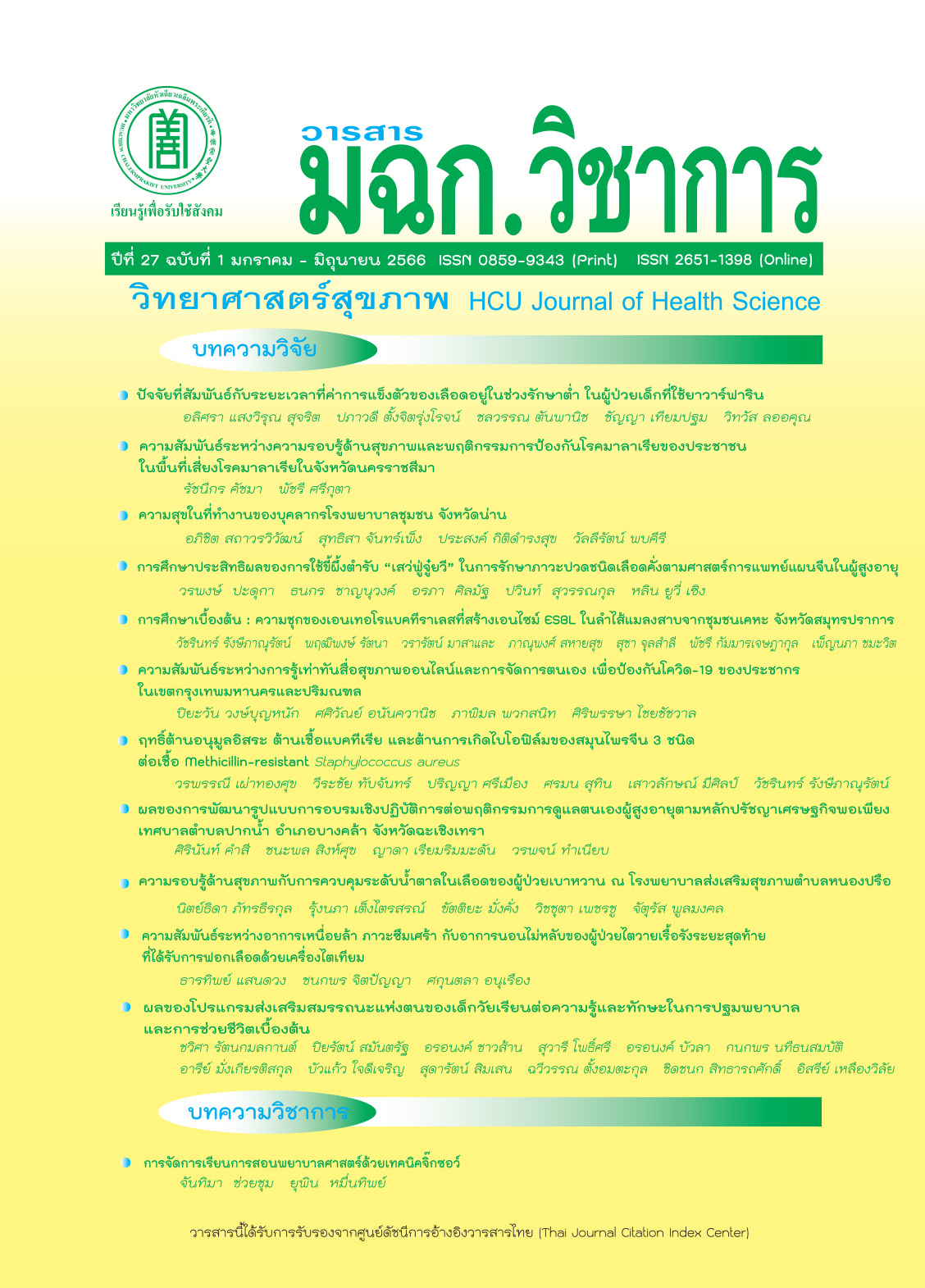The Effects of a Workshop Model Development on Self-Care Behaviors of the Elderly According to the Sufficiency Economy Philosophy in Pak Nam Municipality, Bang Khla District, Chachoengsao Province
Keywords:
Sufficiency Economy Philosophy, Self-care behaviors, ElderlyAbstract
The purpose of this study was to study the result of the development of a workshop model on self-care behaviors for the elderly according to the Sufficiency Economy Philosophy at Pak Nam Municipality, Bang Khla District, Chachoengsao Province. The sample size of 30 people was calculated by Cohen's formula and used to analyze the power of the test. The period to conduct activities in self-care behaviors workshop for the elderly was 6 months. The activities according to the Sufficiency Economy Philosophy included moderation, reasonableness, and good self-immunity, knowledge condition and moral conditions. Data were collected by interview questionnaire and were analyzed by Paired – Samples T- Test. This study found that most of the sample were female, aged between 66 and 70 years old, with marital status, primary education level, income between 5,000 and 10,000 baht, source of income was received from spouse/children/relatives, and the expenses for self-care or illness were 1,000 to 3,000 baht per month. There was participation in the elderly club every time. The overall result of the workshop on the elderly self-care behavior according to the sufficiency economy philosophy before the experiment was 3.53 ± .44 or at a moderate level, and after the experiment it was 4.37±.17 or at a high level. Moreover, the behaviors after the workshop on elderly self-care had a significant statistical difference (p< 0.01). However, in terms of knowledge and experience conditions for self-care and to be applied to the practice of self-sufficient living, it should be linked to family members of the elderly as a supporting factor for success.
Downloads
References
Ministry of Public Health [Internet]. People aged 60 years and over [Internet]. 2022 [cited 2022 June 5]. Available from: https://hdcservice.moph.go.th/hdc/main/index.php.
Eliopoulos C. Manual of gerontological nursing. St. Louis: Mosby Year Book,; 1995.
Cohen J. Statistical power analysis for the behavioral science. 2nd ed. Hillsdale, NJ: Ea Lawrence Erlbaum Associates; 1988.
Chairam P, Suwannaboon P, Kongmian, K. Application of sufficiency economy for developing competency of the elderly in income management for household economy creation in Phetchaburi province. JSBA 2021;6(9):147-59.
Ministry of Social Development and Human Security. The 2nd National Elderly Plan (2002-2021). 1st ed. Bangkok: Theppenwanit; 2010.
Department of Older Persons. Situation of the elderly [Internet]. 2021 [cited 2022 June 5]. Available from: https://www.dop.go.th/download/knowledge/th1610945020-322_0.pdf
Sithikan W. Factors associated with health promotion behaviors of the elderly in Ban Hong subdistrict municipality, Banhong district, Lamphun province [Thesis]. Chiang Mai: Chiang Mai Rajabhat University; 1997.
Phanchey S. Sufficiency economy in Public Health. Krabi Medical Journal 2021;2:85-7.
Gravetter FJ, Forzano LB. Research methods for the behavioural sciences. Brockport: Cengage Learning; 1951. p. 146.
Fitzpatrick AR. The meaning of content validity. Applied Psychological Measurement 1983;7(1):3–13. doi.org/10.1177/014662168300700102.
Cronbach LJ. Coefficient alpha and the internal structure of tests. Psychometrika 16 1951;no.(vol.):297–334. doi.org/10.1007/BF02310555.
Somboon S, Anchalee H, Ganla P, Somboon S. The development of a self-care curriculum for the elderly according to the sufficiency economy philosophy [Internet]. 2022 [cited 2022 June 5]. Available from: https://shorturl.asia/i85Pn
Soonthorndhai W.. Rationale behind the development of the 5-level decision [Internet]. 2023 [cited 2023 January 20]. Available from: https://shorturl.asia/gUBtC
Somsuvun C, Yaowaboot A. Factors associated with caregiver roles for chronically ill Eelders in Muang district, Ubonratchathani. HCU Journal 2021;25(2):273-87.
Vichean U, Sornjaeng D, Boonrasri J. Development of the health care new normal model for elderly Chachoengsao province. J Royal Thai Army Nurses 2021;22:151-9.
Sumpowthong K, Palangrit S. Development of quality of life among the elderly utilizing: the concept of sufficiency economy and community participation, Pathum Thani province, Thailand. Journal of Nursing and Health care 2016;34(2):132-41.
Arpanantikul M. Sufficient health. Thai Journal of Nursing Council 2561;33(2):5-14.
Kultawatwong S, Koonsorn S. The development of elderly’s life quality on self- dependent by the philosophy of sufficiency economy: a case study of Loei province. Santapol College Academic Journal 2021;8(1):149-58.
Downloads
Published
How to Cite
Issue
Section
License
Copyright (c) 2023 HCU Journal

This work is licensed under a Creative Commons Attribution-NonCommercial-NoDerivatives 4.0 International License.
บทความที่ได้รับการตีพิมพ์เป็นลิขสิทธิ์ของวารสารวิทยาศาสตร์สุขภาพและสุขภาวะ
ข้อความที่ปรากฏในบทความแต่ละเรื่องในวารสารวิชาการเล่มนี้เป็นความคิดเห็นส่วนตัวของผู้เขียนแต่ละท่านไม่เกี่ยวข้องกับมหาวิทยาลัยหัวเฉียวเฉลิมพระเกียรติ และคณาจารย์ท่านอื่นๆในมหาวิทยาลัยฯ แต่อย่างใด ความรับผิดชอบองค์ประกอบทั้งหมดของบทความแต่ละเรื่องเป็นของผู้เขียนแต่ละท่าน หากมีความผิดพลาดใดๆ ผู้เขียนแต่ละท่านจะรับผิดชอบบทความของตนเองแต่ผู้เดียว




